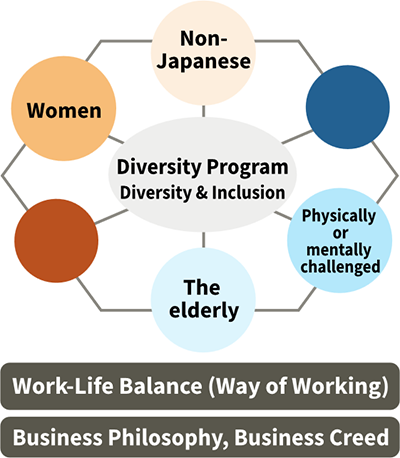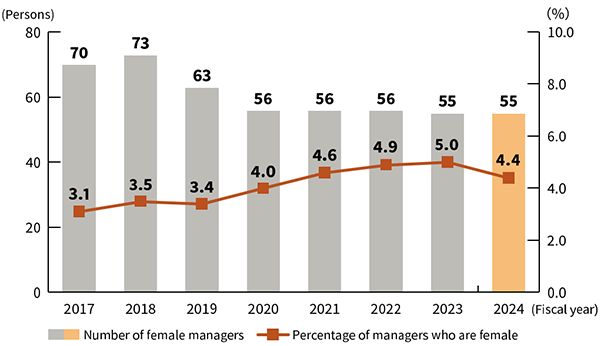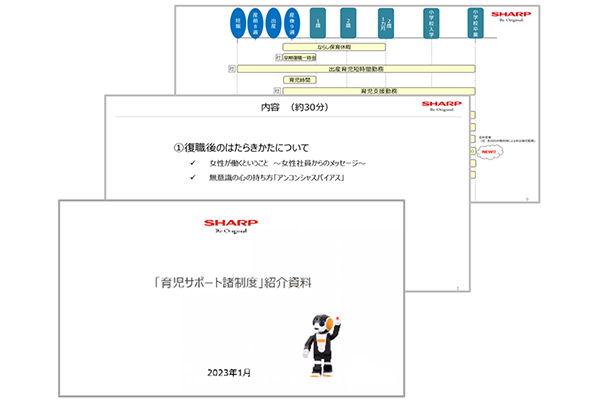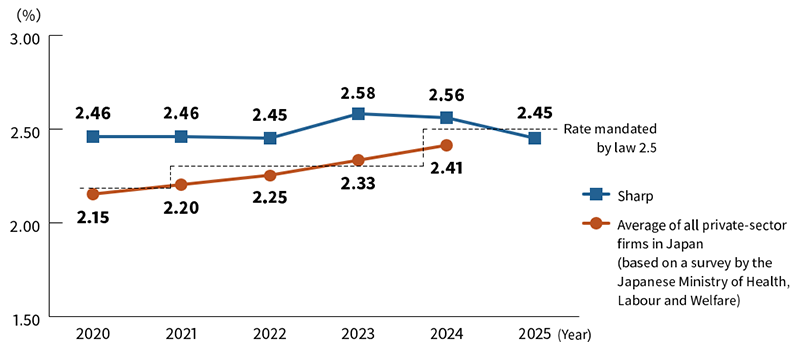Diversity Management
Developing Diversity Management
| Fiscal 2022 Objectives | Fiscal 2022 Achievements | Self-Evaluation | Priority Objectives for Fiscal 2023 |
|---|---|---|---|
|
|
★ |
|
- Self-evaluation: ★★★ Achieved more than targeted / ★★ Achieved as targeted / ★ Achieved to some extent
Basic Concept
Sharp's business philosophy, established in 1973, embraces the concept of diversity by stating that “It is the intention of our corporation to grow hand-in-hand with our employees, encouraging and aiding them to reach their full potential and improve their standard of living.” We aim to produce new value based on mutual respect among employees and to develop and propose products and services that can contribute to better lives, creating the next future with customers.
Diversity management is a human resources strategy for utilizing a diverse range of employees, but we regard it as a business strategy at the same time. Also, the Sharp Code of Conduct states that, “In any corporate activities, including employment practices such as hiring, payment, promotion, opportunities for training and the like, we do not take any action that constitutes discrimination based on nationality, race, ethnic group, color, sex, physical health, pregnancy, sexual orientation, age, marital status, religion, creed, social status, birth, property, bodily feature, physical or mental disability, political opinion, and the like,” and that, “We will actively take part in efforts to enhance the work environment where employees with diverse characteristics can fully demonstrate their abilities.” This is what Sharp is actively working towards, giving individual consideration based on need.
Diversity Management

Promoting Activities of Female Employees
Sharp formulated an action plan based on Japan's Act on Promotion of Women's Participation and Advancement in the Workplace, which came into effect in April 2016. In line with this action plan, Sharp is working to raise the percentage of women in all job categories and increase the number of women in managerial positions. This will enable it to achieve further diversity in its workforce and contribute to society through better products and services. To this end, Sharp has set the following goals and is actively pursuing further engagement of its female employees.
Sharp Corporation’s Action Plan Based on the Act on the Promotion of Women’s Active Engagement in Professional Life
| Goal | Deadline |
|---|---|
|
By the end of fiscal 2024 |
Promoting Female Employees to Managers
For years, Sharp has striven to expand the roles of women in the workplace and promote female employees to managers. As of the end of fiscal 2022, the percentage of managers who were female was 4.9%, compared to 0.6% in the year Sharp launched a program to promote more women to managerial positions.
Number of Female Managers at Sharp Corporation

Supporting Employees Returning from Maternity or Childcare Leave
Sharp has held reinstatement support seminars every year since fiscal 2014. These seminars involve an explanation of the company’s current circumstances and the various support systems related to childbirth and nursing. As well, employees who have returned to work after taking childcare leave share their experiences and provide advice on how to balance work and child rearing. Attendees are also given the opportunity to build networks with other working mothers. These seminars help to resolve anxiety during time off from work and foster a positive mindset about returning to work.
Starting in fiscal 2020, the classroom-style seminar was changed to an online seminar to make it easier for participants to join from home while looking after children. This change was the result of feedback expressed during reinstatement support-related interviews with employees. With more male employees helping raise children in recent years, the number of seminar participants has been growing. To build a stronger support system encompassing the returning employee’s family and the workplace, the online seminars now have videos for returning employees, their spouses, and bosses, and messages of encouragement from colleagues. Sharp will continue to listen to employees and incorporate their feedback as it works to become an even better and more attractive place to work.
Sharp also has two systems in place to support employees who are eager to advance their careers after returning to work after childbirth. One is for giving one-off payments to employees making an early return from childcare leave and the other is for subsidizing the fees for non-registered daycare facilities for employees with children at age two or younger, who fall outside the scope of the government program for free early childhood education and care.

Screen shots of the reinstatement support video
Sharp Japan Consolidated Personnel Composition, by Gender (As of March 31, 2023)
(Persons)
| Men | Women | Total | |
|---|---|---|---|
| Consolidated domestic companies | 16,098 | 2,001 | 18,099 |
| Ratio | 88.9% | 11.1% |
Sharp Corporation Personnel Composition, by Gender (As of March 31, 2023)
(Persons)
| Men | Women | Total | ||
|---|---|---|---|---|
| Directors, audit and supervisory committee members | 7 | 0 | 7 | |
| Employees | Executive officers | 4 | 0 | 4 |
| Managers | 1,078 | 56 | 1,134 | |
| General staff | 3,494 | 689 | 4,183 | |
| Subtotal | 4,576 | 745 | 5,321 | |
| Total | 4,583 | 745 | 5,328 | |
| Ratio | 86.0% | 14.0% | ||
| Average age | 45.9 | 43.4 | 45.6 | |
|---|---|---|---|---|
| Average years of service | 22.7 | 20.7 | 22.4 | |
| New graduate hires (graduates of universities and technical colleges, April 3, 2023) | 184 | 37 | 221 | |
|---|---|---|---|---|
Sharp Corporation Annual Average Wages, by Gender (Fiscal 2022)
| Men | Women | |
|---|---|---|
| Gender wage ratio per employee | 1 | 0.796 |
Ratio of Men and Women at Major Overseas Subsidiaries (As of March 31, 2023)
| Base | Directors, managers | Non-supervisory employees (permanent employees) | Total | ||||
|---|---|---|---|---|---|---|---|
| Men | Women | Men | Women | Men | Women | ||
| SEC (US) | Sales, production | 79.2% | 20.8% | 68.0% | 32.0% | 68.9% | 31.1% |
| SEE (UK) | Sales, production | 77.6% | 22.4% | 73.3% | 26.7% | 74.1% | 25.9% |
| SEID (Indonesia) | Sales, production | 83.3% | 16.7% | 70.8% | 29.2% | 71.5% | 28.5% |
| SATL (Thailand) | Production | 63.3% | 36.7% | 31.8% | 68.2% | 32.4% | 67.6% |
| SMM (Malaysia) | Production | 78.9% | 21.1% | 41.6% | 58.4% | 44.5% | 55.5% |
| SOCC (China) | Production | 84.8% | 15.2% | 25.0% | 75.0% | 31.0% | 69.0% |
| NSEC (China) | Production | 64.6% | 35.4% | 64.5% | 35.5% | 64.5% | 35.5% |
| WSEC (China) | Production | 60.1% | 39.9% | 46.0% | 54.0% | 47.1% | 52.9% |
Expanding Opportunities for Non-Japanese Employees in Japan
With the globalization of business, Sharp is working globally to secure and systematically train human resources who can meet the needs of each workplace. In recent years, Sharp has promoted greater employment of international students and people of other nationalities residing in Japan. As of April 2023, we have approximately 120 non-Japanese employees from 12 countries working in various departments and job categories. To avoid illegally employing undocumented workers, Sharp checks the residence status of all foreign nationals before hiring them. This follows the advice of the Immigration Services Agency of Japan’s Ministry of Justice. (Sharp uses an Agency website to validate residence card numbers.)
Reemployment of Retirees
In 2001, Sharp introduced a professional employee system that reemploys employees who have reached the mandatory retirement age of 60. This stems from the company’s stance on promoting the utilization of senior employees who have a strong work ethic. It also takes into consideration employees who wish to give back and contribute to society through the skills and knowledge they have accumulated over many years.
At present, employees who have reached the mandatory retirement age of 60 (and who wish to continue working until the age of 65) are redeployed with the company. In response to the Act on Stabilization of Employment of Elderly Persons—which came into effect in April 2021—Sharp is considering offering guaranteed employment up to the age of 70.
Promoting Employment of the Disabled
Ever since Sharp founder Tokuji Hayakawa established the “accumulation of community service” as one of the “Five Accumulations of Competency*1,” Sharp has been actively involved in social service and welfare. The entire Sharp Group makes efforts to promote the employment of the disabled and to create a better work environment for these employees.
Specifically, Sharp launched a recruitment website addressing the employment of disabled people. This website contains information on initiatives to hire such individuals to work in the Sharp Group. Sharp is also striving to make the working environment more accessible for disabled employees. For example, during training sessions attended by hearing-impaired participants, there are support measures such as voice recognition software and PC note-taking (a method for conveying audio information by entering it into the keyboard of a PC) so that voice communication is converted into text for participants to read and understand.
- *1 Accumulation of trust, accumulation of capital, accumulation of community service, accumulation of human resources, and accumulation of trading partners.
Employment Rate of the Disabled in Japan
As of June 1, 2023, Sharp Corporation, a Sharp special subsidiary*2, and group companies*3 employed approximately 330 disabled persons. The percentage of disabled employees among all employees was 2.58%, above the 2.3% rate mandated by law (as stated in Japan’s Act to Facilitate the Employment of Persons with Disabilities).
- *2 A subsidiary that a company establishes and that gives special consideration in employing the disabled, in order to provide them with more employment opportunities and greater job security.
- *3 In calculating the employment rate of the disabled, these are Sharp Group subsidiaries, other than special subsidiaries, that are certified by the head of a public employment security office.
Employment Rate of the Disabled in Japan

- Data as of June 1 each year for Sharp Corporation, a Sharp special subsidiary, and group companies.
Increasing Mid-Career Hires
To acquire employees who can help expand new business and to foster a corporate culture that is youthful and highly motivated, we are strengthening our mid-career hiring. Ways we are doing this include directly approaching people we want to hire, and boosting Sharp’s attractiveness as a place to work. Our target has been to have mid-career hires account for about 30% of new Sharp Group employees in Japan. Mid-career hires accounted for 37% in fiscal 2020, 29% in fiscal 2021, and 29% in fiscal 2022.